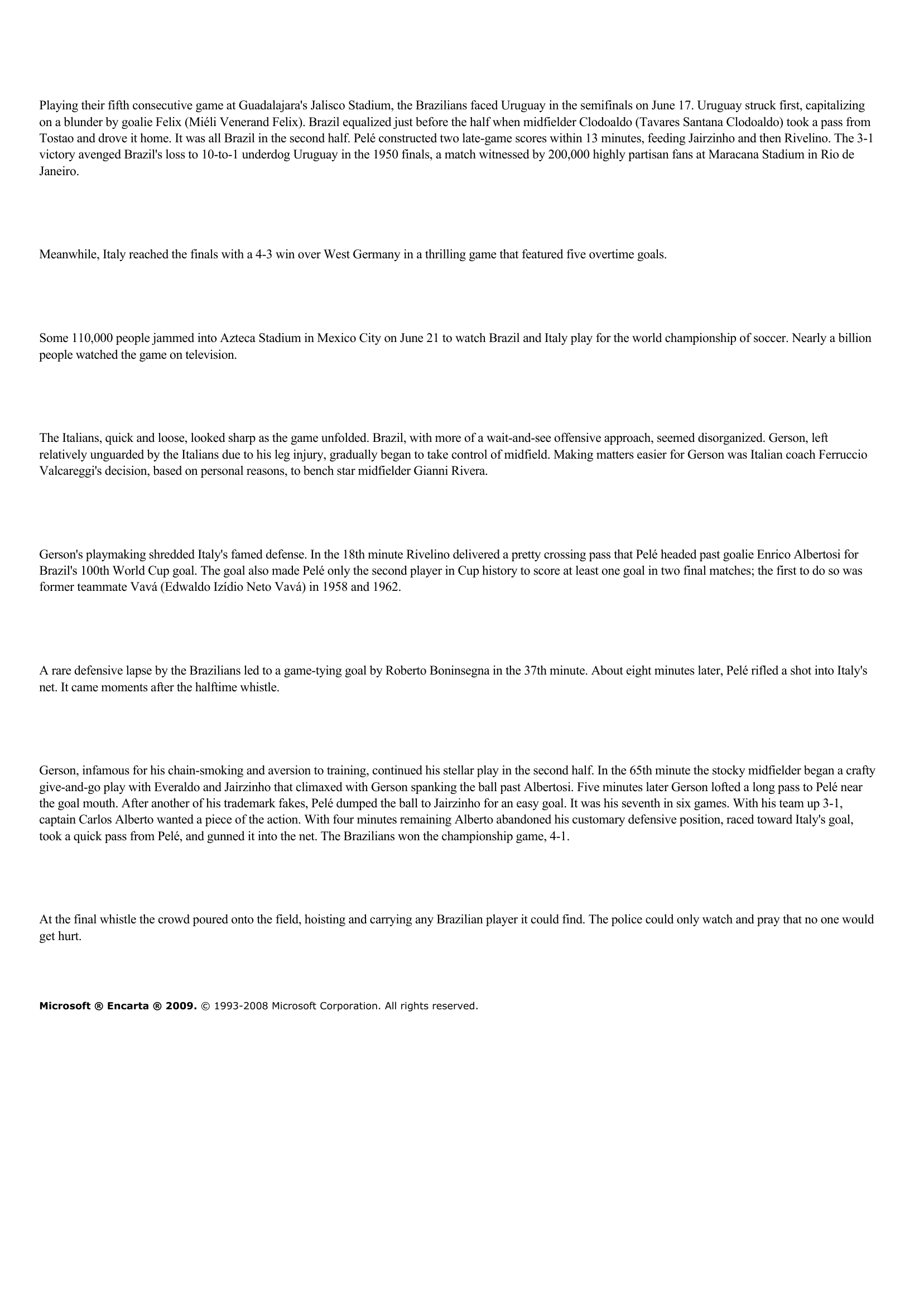Brazil Wins Third World Cup In Soccer.
Publié le 14/05/2013

Extrait du document
«
Playing their fifth consecutive game at Guadalajara's Jalisco Stadium, the Brazilians faced Uruguay in the semifinals on June 17.
Uruguay struck first, capitalizingon a blunder by goalie Felix (Miéli Venerand Felix).
Brazil equalized just before the half when midfielder Clodoaldo (Tavares Santana Clodoaldo) took a pass fromTostao and drove it home.
It was all Brazil in the second half.
Pelé constructed two late-game scores within 13 minutes, feeding Jairzinho and then Rivelino.
The 3-1victory avenged Brazil's loss to 10-to-1 underdog Uruguay in the 1950 finals, a match witnessed by 200,000 highly partisan fans at Maracana Stadium in Rio deJaneiro.
Meanwhile, Italy reached the finals with a 4-3 win over West Germany in a thrilling game that featured five overtime goals.
Some 110,000 people jammed into Azteca Stadium in Mexico City on June 21 to watch Brazil and Italy play for the world championship of soccer.
Nearly a billionpeople watched the game on television.
The Italians, quick and loose, looked sharp as the game unfolded.
Brazil, with more of a wait-and-see offensive approach, seemed disorganized.
Gerson, leftrelatively unguarded by the Italians due to his leg injury, gradually began to take control of midfield.
Making matters easier for Gerson was Italian coach FerruccioValcareggi's decision, based on personal reasons, to bench star midfielder Gianni Rivera.
Gerson's playmaking shredded Italy's famed defense.
In the 18th minute Rivelino delivered a pretty crossing pass that Pelé headed past goalie Enrico Albertosi forBrazil's 100th World Cup goal.
The goal also made Pelé only the second player in Cup history to score at least one goal in two final matches; the first to do so wasformer teammate Vavá (Edwaldo Izídio Neto Vavá) in 1958 and 1962.
A rare defensive lapse by the Brazilians led to a game-tying goal by Roberto Boninsegna in the 37th minute.
About eight minutes later, Pelé rifled a shot into Italy'snet.
It came moments after the halftime whistle.
Gerson, infamous for his chain-smoking and aversion to training, continued his stellar play in the second half.
In the 65th minute the stocky midfielder began a craftygive-and-go play with Everaldo and Jairzinho that climaxed with Gerson spanking the ball past Albertosi.
Five minutes later Gerson lofted a long pass to Pelé nearthe goal mouth.
After another of his trademark fakes, Pelé dumped the ball to Jairzinho for an easy goal.
It was his seventh in six games.
With his team up 3-1,captain Carlos Alberto wanted a piece of the action.
With four minutes remaining Alberto abandoned his customary defensive position, raced toward Italy's goal,took a quick pass from Pelé, and gunned it into the net.
The Brazilians won the championship game, 4-1.
At the final whistle the crowd poured onto the field, hoisting and carrying any Brazilian player it could find.
The police could only watch and pray that no one wouldget hurt.
Microsoft ® Encarta ® 2009. © 1993-2008 Microsoft Corporation.
All rights reserved..
»
↓↓↓ APERÇU DU DOCUMENT ↓↓↓
Liens utiles
- South Africa Wins Rugby World Cup.
- Argentina Wins World Cup.
- World Cup Winners.
- World Cup Skiing Champions.
- Oerter Wins Third Gold Medal.


